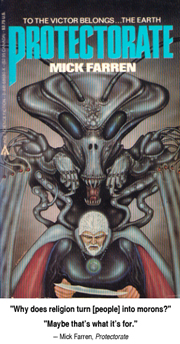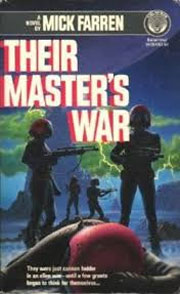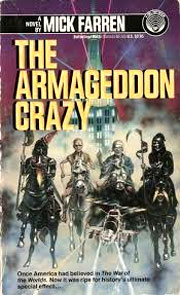 by Zeke Teflon, author of Free Radicals
by Zeke Teflon, author of Free Radicals
A few years ago, the Publishers Weekly review of Free Radicals noted that it was “reminiscent of early Mick Farren.” That was news to me: I’d never heard of Mick Farren; and why early Mick Farren?
I decided to investigate, and discovered that Farren (1943–2013) was best known for his musical work, most famously as front man for the London-based garage/proto-punk band The Deviants in the late 1960s. He turned to writing full time in the early 1970s, but continued to be active musically, releasing two solo albums in the ’70s and, among other things, he collaborated on song writing with Lemmy Kilmister of Motorhead, and recorded with Wayne Kramer from the American proto-punk band The MC5. In later years, he continued to perform with re-formed versions of The Deviants, and was musically active for the rest of his life — he died on stage while performing. (The Guardian‘s obituary of Farren, though it gives short shrift to his literary output, provides a good summation of his musical career.)
But what of Farren’s literary output? In the early 1970s, he began to make his living as a music journalist, and also began writing both nonfiction books and science fiction novels. In all, he wrote approximately 20 nonfiction books, almost all on music or politics, and more than 15 sci-fi novels. However, starting in the ’90s, he turned to the horror/supernatural subgenre, for which he’s now largely remembered. Hence the PW reviewer’s reference to his “early” (sci-fi) writings.
 The distinguishing features of those writings are a gritty tone, frequent dark humor, an anti-authoritarian leftist political bent, good descriptive writing, a predominance of narrative rather than exposition, a straightforward writing style, close third-person narration, believable dialogue, hard-drinking and drugging protagonists from the fringes of society who find themselves thrust into threatening situations, and unusual, inventive settings.
The distinguishing features of those writings are a gritty tone, frequent dark humor, an anti-authoritarian leftist political bent, good descriptive writing, a predominance of narrative rather than exposition, a straightforward writing style, close third-person narration, believable dialogue, hard-drinking and drugging protagonists from the fringes of society who find themselves thrust into threatening situations, and unusual, inventive settings.
One good example of most of these traits is Farren’s Their Masters’ War (1987). The back cover copy reads: “Hark was a hunter, armed with spear and club, seeking game to feed his tribe — until a prophecy led him to the Valley of the Gods, where he was herded with others like himself into the belly of a metal monster. Suddenly Hark was a grunt fighting a war against machines and aliens for a mysterious race called the Therem. . . . Battle was tough and human life worthless. But Hark and the others never questioned their roles as soldiers until they were dropped into a hellish battle on an inhospitable world . . . And for the first time they set out to make their own destiny.”
 Here you have the prototypical Farren setup: an outsider hurled into a dire situation, religion used as a means of manipulation, a very gritty tone, a predominance of narrative with small amounts of exposition skillfully woven into it, an anti-militarist subtext, vivid descriptive passages, and natural-sounding dialogue. (Strangely enough, the dialogue would have been helped by more cursing — something that’s normally plentiful in Farren’s work — given that Their Master’s War is basically military sci-fi.) About the only thing missing is Farren’s characteristic dark humor.
Here you have the prototypical Farren setup: an outsider hurled into a dire situation, religion used as a means of manipulation, a very gritty tone, a predominance of narrative with small amounts of exposition skillfully woven into it, an anti-militarist subtext, vivid descriptive passages, and natural-sounding dialogue. (Strangely enough, the dialogue would have been helped by more cursing — something that’s normally plentiful in Farren’s work — given that Their Master’s War is basically military sci-fi.) About the only thing missing is Farren’s characteristic dark humor.
The book does have minor problems, though. Most noticeably, Farren doesn’t seem to care much about getting the science right — at one point he describes a planet orbiting a double star as making a figure-eight pattern around the pair of stars — and the reason for the subsequent battle on that planet is, upon minimal reflection, ludicrous. As well, the lack of humor is unfortunate, as it’s one of the most attractive features of Farren’s other sci-fi novels.
Their Master’s War is a good example of Farren’s work, but if you’re only going to read one of his sci-fi novels, it’s not the one to read. That one should be The Armageddon Crazy (1989).
 Of Farren’s sci-fi novels, The Armageddon Crazy is the most immediately relevant to the present day, as its backdrop is a United States taken over by fundamentalist crazies and which has become a theocratic police state in the wake of an economic crash.
Of Farren’s sci-fi novels, The Armageddon Crazy is the most immediately relevant to the present day, as its backdrop is a United States taken over by fundamentalist crazies and which has become a theocratic police state in the wake of an economic crash.
The back cover copy reads in part: “The president was a preacher, the constitution had been suspended, and strong-arm deacons sent sinners and malcontents to prison. Harry Carlisle: disaffected New York cop, walking a think line between obedience and heresy. Cynthia Kline: secret agent in the deacon organization, terrified that any moment her cover might be blown. Charlie Mansard: special-effects wizard . . . They never suspected the roles they would play in a plot to overthrow the government and restore freedom. And they never dreamed that they would be smack dab in the middle of the chaos when everything fell apart.”
The Armageddon Crazy begins with an all-too-believable description of one of its protagonists, “special-effects wizard” Charlie Mansard, delivering a drunken, politically charged monologue in a near-empty New York City dive bar. The monologue concerns the state of the country, which has fallen under a brutal fundamentalist theocracy, complete with religious police, torturers, death squads, and concentration camps for the ungodly–indeed for anyone the “deacons” happen to dislike.
Farren then introduces the other characters, including the primary character, Harry Carlisle, a politically suspect (by the deacons) lieutenant in the NYPD, who’s charged with hunting down the Lefthand Path, a bomb-planting group that utilizes violence in a political situation where other forms of political opposition are outlawed, and the nonviolent opposition is already in “the camps.”
Shortly, Mansard is commissioned to create a massive visual spectacle inside and outside of Madison Square Garden for Arlen Proverb, a charismatic evangelical preacher being targeted by the deacons because of his popularity and because he’s a potentially uncontrollable wild card.
The events at the Proverb rally subsequently lead both Carlisle and Proverb into a plot to overthrow the repressive fundamentalist government.
One peculiarity of The Armageddon Crazy is that it’s written from multiple points of view, including those of two characters entirely peripheral to the book’s plot, but who are there simply to provide background. As well, Mansard’s sections are quite large given that he’s somewhat peripheral to the plot. One strongly suspects that Farren dwells at length on Mansard and his show-biz activities largely because Farren was a prominent rock performer who was quite familiar with show biz, its workings, and its denizens.
In most novels, these things would be a problem, but they’re not here because Farren’s backgrounds and descriptions are so damn entertaining.
The Armageddon Crazy and Their Master’s War represent the best of Mick Farren’s science fiction. They’re gritty, funny (at least The Armageddon Crazy) page-turners with a lot to say politically and socially.
If you’ve never read Farren’s sci-fi novels, you might consider picking up one or both of these books. I very much doubt that you’d be disappointed.
(Please note that Mick Farren’s novels, like those of many other writers, are very uneven. I’ve read or at least started all of Farren’s sci-fi novels, and The Armageddon Crazy and Their Master’s War are the two that I’d have no hesitance in recommending.)
Touchingly, both The Armageddon Crazy and Their Master’s War end with the same brief description of the author:
Mick Farren is a hopelessly unreconstructed side effect of the late sixties and seventies who still entertains the absurd idea that a writer should be some swashbuckling, Byronic figure who has quite as much fun as any of his characters. Accordingly, he continues to play rock & roll in the saloons of New York, drinks too much, wears a lot of black, and still harbors a desire to be rich and famous before his excesses catch up with him.
* * *
Zeke Teflon, the author of Free Radicals: A Novel of Utopia and Dystopia (pdf sample here), is currently working on its sequel and on an unrelated sci-fi novel. Now that he’s discovered Mick Farren’s sci-fi novels, he’s honored by the comparison of his writing to Farren’s.

[…] Their Master’s War (1987). An entertaining page-turner concerning militarism, imperialism, and religious manipulation in the guise of military sci-fi. […]
LikeLike
[…] Their Master’s War (1987). Antiauthoritarian but not anarchist. A page-turner concerning militarism, imperialism, and religious manipulation. […]
LikeLike